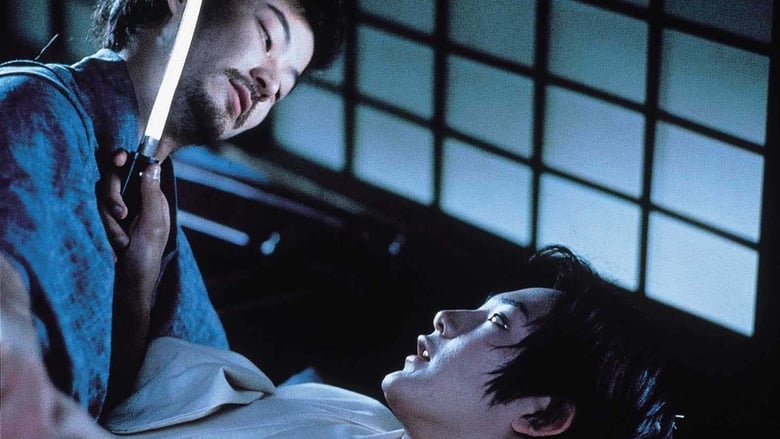← Back to Reviews

in
Gohatto (Taboo) (1999)

What exactly is the ‘taboo’ of the title? With whom is the central character in love, if anybody? What kind of mysterious power does he possess? What is the film about? Is it, in fact a good film at all?
If this review is more questions than facts or even opinion, it is because the film itself is more about questions than answers, more about mystery and beauty than plot or character.
Sozaburo Kano becomes a Samurai and enters a strange world ruled by loyalty, secrecy, ritual and violence. The Samurai possess a code of honour which requires the execution early in the film of a fellow samurai who has violated this code by borrowing money. Kano is chosen to carry out this task and it is this initiation by blood and the pleasure both he and those watching him seem to take in this act of violence that give a clue to the aims and themes of the film.
Tashiro joins the Samurai at the same time and is instantly smitten by Kano; he is the first of many who become maddened with desire for the beautiful, enigmatic, androgynous Kano. The film is largely seen through the eyes of Captain Toshizo Hijikata, who may or may not be one of those in love with him.
The film is not so much a puzzle with a solution as a visual poem mediating on the nature and contradiction of beauty and violence and the dangers of desire. There are even times during the film where the story is told through titles on a black screen rather than performed by the actors, adding to the poetic effect. The final scene in which Captain Hijikata cuts down a blossom tree is loaded with symbolism, but the reasons for certain actions and the nature of certain relationships remain maddeningly elusive. This could lead people to view it as a film with no point; but I think to see it that way would be to miss the point of the film; like the story told by one Samurai to another towards the end of the film, it could have many interpretations. It is also clear that this is a lost and foreign culture, the rules and taboos of which are probably beyond our comprehension.
Visual poems, however, have their limitations. It is frustrating to watch a film with no answers, where we cannot tell what the characters are thinking. For a film whose main themes are sexuality and violence, it is surprisingly short on both. As with Kano himself, Gohatto is lovely to look at, but sometimes it isn’t easy to tell if there really is any depth or feeling behind the beauty, or whether we have been beguiled by beauty alone.
3/5

What exactly is the ‘taboo’ of the title? With whom is the central character in love, if anybody? What kind of mysterious power does he possess? What is the film about? Is it, in fact a good film at all?
If this review is more questions than facts or even opinion, it is because the film itself is more about questions than answers, more about mystery and beauty than plot or character.
Sozaburo Kano becomes a Samurai and enters a strange world ruled by loyalty, secrecy, ritual and violence. The Samurai possess a code of honour which requires the execution early in the film of a fellow samurai who has violated this code by borrowing money. Kano is chosen to carry out this task and it is this initiation by blood and the pleasure both he and those watching him seem to take in this act of violence that give a clue to the aims and themes of the film.
Tashiro joins the Samurai at the same time and is instantly smitten by Kano; he is the first of many who become maddened with desire for the beautiful, enigmatic, androgynous Kano. The film is largely seen through the eyes of Captain Toshizo Hijikata, who may or may not be one of those in love with him.
The film is not so much a puzzle with a solution as a visual poem mediating on the nature and contradiction of beauty and violence and the dangers of desire. There are even times during the film where the story is told through titles on a black screen rather than performed by the actors, adding to the poetic effect. The final scene in which Captain Hijikata cuts down a blossom tree is loaded with symbolism, but the reasons for certain actions and the nature of certain relationships remain maddeningly elusive. This could lead people to view it as a film with no point; but I think to see it that way would be to miss the point of the film; like the story told by one Samurai to another towards the end of the film, it could have many interpretations. It is also clear that this is a lost and foreign culture, the rules and taboos of which are probably beyond our comprehension.
Visual poems, however, have their limitations. It is frustrating to watch a film with no answers, where we cannot tell what the characters are thinking. For a film whose main themes are sexuality and violence, it is surprisingly short on both. As with Kano himself, Gohatto is lovely to look at, but sometimes it isn’t easy to tell if there really is any depth or feeling behind the beauty, or whether we have been beguiled by beauty alone.
3/5
